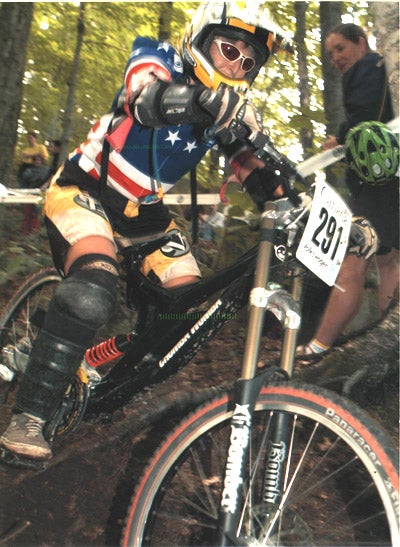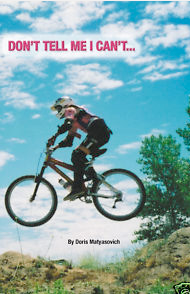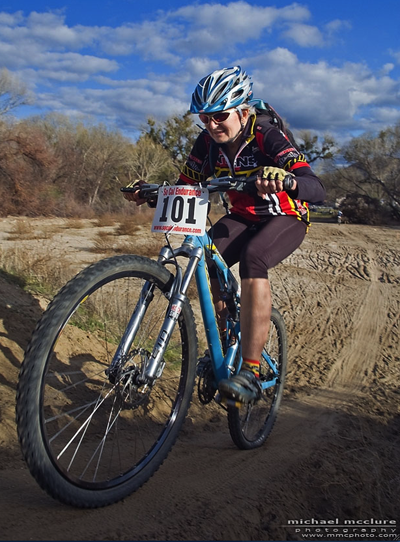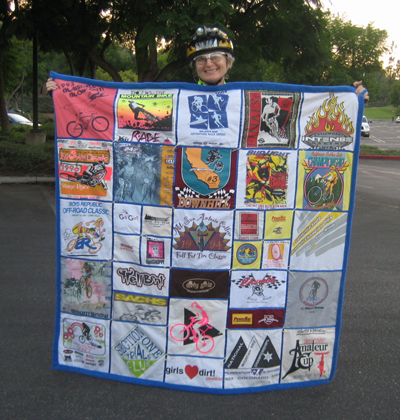
I was lucky enough to meet Doris Matyasovich–2003 DH Masters World Champ, 17-time Masters National XC Champ, and author of –at the 12 Hours of Temecula. She was racing solo. You might ask why that's such a big deal. Well, it's because she started racing at 45 and has stuck with it for the past 21 years. You do the math. And the next time you think you can't do something for whatever reason, think again.
What switch flipped for you to start racing at 45?
I have always liked competition–races in elementary school, baton twirling in high school, 10K races in my thirties–so MTB racing just seemed a natural thing to want to do, but I thought women didn't do it. When I found out women actually did do it, and so many men were telling me to try it, it seemed a possibility, but I was worried about being so much older than the others. The 'switch' was when I found out there was a 45+ class for women. Since I was 45 that year, I instantly knew I had to try it. I may never have tried racing if I had to bewith people considerably younger than me. One of my pet peeves about racing is lack of age groups for older women. I wonder how many women are out there wanting to race, but are too intimidated to go against much younger ones? No woman in southern California had raced the 45+ class before I came on the scene, yet it was consistently offered. When I race now, the decision is whether to race women sometimes younger than my children, or race with men my age. Neither option is especially attractive. Very frustrating.

You raced BMX, XC, downhill, and trails. Anything else?
I raced dual slalom for a few years starting at 50 years old and did a few super Ds, also a couple of 24-hour races on a team. At 60, I did some adventure races as part of a three-woman team, and at 65 I started doing 12-hour races as a solo rider.
How many National titles do you have?
One master's world championship, 13 national championships, 17 state championships.
You've said your whole identity is wrapped up in racing and you'd feel lost if you quit. But you're retired now?
Yes, I am retired from serious and regular racing. Yes, I am now feeling somewhat lost and wondering what to do with the rest of my life. I was just getting bored with the whole scene and things were changing, and I was probably burned out after so many years. Also, I had won everything there was to win, so there were no new challenges. It was so exciting to be introduced tothe 12 Hours of Temecula series and have a group of friends to do it with. I'm not sure I will continue to do this or not. Now, I am mostly looking for new and interesting experiences.
You ride the Fullerton loop quite a bit. Is that your favorite ride?
I don't have a favorite ride. Any time I'm on a bike I am having a good day! Fullerton is a fun short loop. I enjoy the socializing and eating out afterward, and the chance to ride at night. I look at it as a short training ride because I have to work hard to keep up with the group.
Who is your main competition? Wendy Skean?
If I continue to do the 12-hour races, Wendy would be my main competitor. We would race in the men's class because there is no women's class for our age. When I race with men they are usually much faster than I am, but once in a while I can beat them or at least give them a good run for their money. It is quite fun to see how worried they are about being beat by me. Sometimes there are men who are just slower than I am. It absolutely makes my day when I beat a man, but at the same time I feel sort of bad that I am the cause of their embarrassment. Some men take it quite well, even to the point of giving me a hug and congratulating me, and others make all kinds of excuses. At this point, I am not worried about winning. I am just out to do the best I can and hope it's good enough to podium. Especially for a 12-hour race, I don't worry about where my competitors are. I am totally monitoring myself, making sure I don't go out too fast, that I'm drinking enough, eating enough, etc.
How do you deal with racing disappointment?
If I did the best I could and everything went well, then I am content. That person was just better on that day at that race. If I didn't win because of a mechanical, then it's very frustrating, but just part of racing–it goes with the territory. It happens to everyone sooner or later.

What are the advantages of age for racing and training?
I never had to think about what time of the month it was! I also think I had a pretty good idea of what my body could do and most of the time didn't push beyond the limits. Hopefully that enabled me to avoid excessive injuries.
I read in your book you hoped to be racing at 50. How old are you now?
I am 67 now! I am delighted that I can still do these things! I may be the oldest woman racing mountain bikes in the country, but I'm not absolutely sure. Wendy is nine months younger than I am. When I started at 45, I never dreamed I would still be doing this into my sixties. Now I'm wondering if I can continue till I'm 70. I'm curious to see how long I can go.
What's your next race?
My next big event is the Counting Coup. It is a ride, not a race. It is 44 miles with 8000' elevation gain. I will probably be the oldest woman to ever do it. I love breaking age barriers.
How many people your age are still racing?
Wendy is the only woman I am aware of. There are a few men my age and even older.
What compelled you to write your book?
I wanted to write about my experiences, thoughts, and feelings so my children and grandchildren and so on could get an idea of what their ancestor was like. I would love to have something like this about the women in my family that came before me. As it came to completion though, I thought maybe others would like to read it, too. So many people ask me how I got started and stuff.
Was that your way of giving back?
Yes, you might say that. Many racers have told me I should write a book. I hope it inspires people, women especially, to realize age is just a number. I also want young women to appreciate the opportunities they have in sports now. It wasn't that long ago when they were not encouraged or even allowed to compete in some sports. When I was in school girls had to play half-court basketball, because it was believedthat we didn't have the stamina to play full court. Women were not allowed to run marathons. It was believed it would damage their health. It's wonderful we have come to the place where girls take it for granted they can compete in just about any sports they want, but please remember it was a long and hard fought battle.
Did you train with a heart-rate monitor and notice any differences through the years?
I have an HR monitor and read the books on how to use it, but didn't strictly follow it. In the early '90s, my max HR was about 178. Now it is about 165.
Were you ever coached?
Not formally. A friend taught me about weight training and gave me a schedule for riding, weights, and stretches, which I followed for a number of years. In 2003, when I bought an international license for the Masters World's in Canada, it included a free online coach for a month or so. I followed this till the World's, but it was very hard, so I dropped it after the race.
What is a typical training week for 12 Hours of Temecula?
When I was seriously racing, I rode mountain bikes four days a week and road two days a week. I also did weight training. Since I retired in 2006, I am just riding for fun. I don't 'train' anymore, and I am down to three mountain and one road ride a week. The mileage has increased, though, since preparing for a 12- hour solo. I haven't done much weight training lately, which I really should get back to. When I was working, I mostly worked swing shift so I could ride in the mornings. Now I am retired, so I can ride whenever! My typical week now is Monday: 4-6 hour mountain ride, usually in the Santa Ana Mountains, Wednesday: 55-mile group road ride, Thursday: Fullerton Loop group ride, Saturday: 4-5 hour mountain ride.

What adjustments have you made in your training as you have gotten older?
I have not changed my training because of getting older. It changed due to not seriously racing. I used to do an average of about 20-25 races a year. Now I do one to three a year. I am trying to do more weight bearing exercises now, such as walking, hiking, aerobics, due to the specter of osteopenia and eventual osteoporosis.
How do you think you shaped master's racing for women?
I don't know how many master's age women were encouraged by my racing, but a few master's age men have told me they started racing because of me! As far as shaping the class, one year I was instrumental in preventing NORBA from dropping master women from the schedule at national races. A few years later, due to my instigation, NORBAintroduced a 55+ class for women.
It seems like the same issues are rolling around for mountain biking.Local and national series are in jeopardy, the fields are small. What have you seen get better/worse in master's racing?
I have not been following the national race scene since I retired in 2006. In my opinion, things began to change about the time MTB racing became an Olympic sport. Before that, every race was like a big party. Most races were pure fun, many put on by grassroots organizations. Later, it became all about the pros and young future stars. The amateurs often seemed to be lost in the shuffle, even though we were themajority of racers. Then the UCI became more involved and mandated some changes, such as reorganizing age groups. This caused much frustration among riders who were anxiously anticipating aging up, only to find they had to wait five more years. It's my understanding that this change was necessary to bring mountain racing into conformity with road racing. The UCI continues to implement changes to make it more like road racing. It's my belief that mountain racing is an entirely different mindset, and much is lost by trying to fit it into a road-racing style. One problem I see now is that the oldest women's sport and beginner groups at many races is 40+. Only the experts have a 50+ class. If a 50+ woman wanted to try racing, she would have to race in the 40+ class with a daily license or pay for a yearly license to race the 50+ class. This is very discouraging. I am now riding or racing at charity events and small promoter races. These seem more like the fun times of the early mountain years.
What was/is the hardest part about lining up on race day?
Lining up on race day is not hard for me. That's where one meets all one's competitors, renews friendships, and gabs about anything or everything till the start time. It's an exciting time. What's hard is waiting for the staging to begin, making sure you have everything you need, hoping you ate the right things at the right times, hoping you checked everything on your bike, hoping the outhouse lines aren't too long.
Tell me about your very first race? How did you do?
I can't think of anything to add to the account on pages 20-22 in my book. Although I was the last finisher, I was first–and only one–in my class.
I love the quilt you made with your racing shirts. What gave you that idea?
I've had the idea for years but never got around to doing it. I was housebound with my broken foot for two months because both our cars are standard transmission so I couldn't drive! So that's when I did the most work on my book and finally got around to making the quilt.